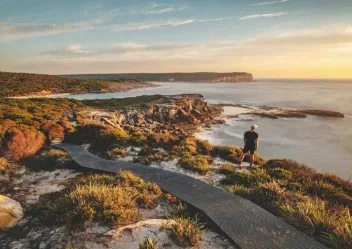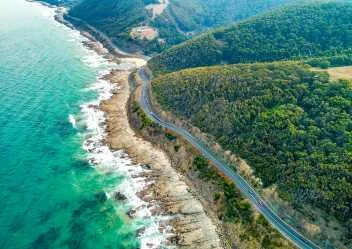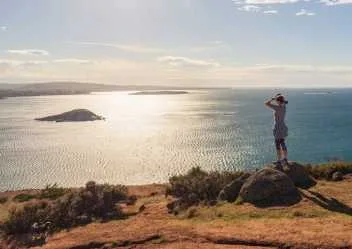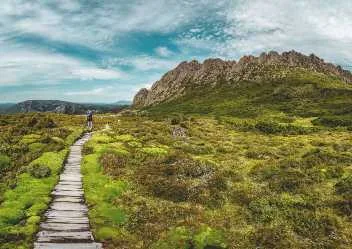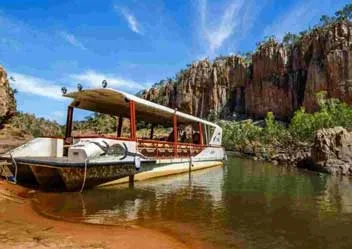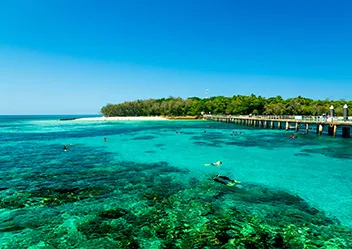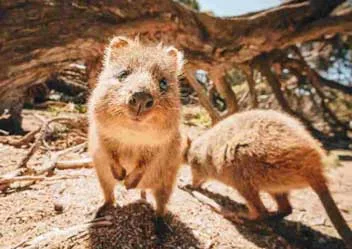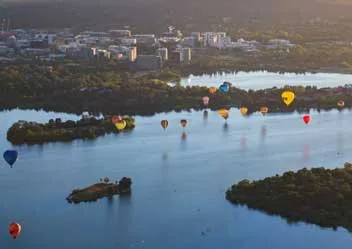Where can I travel in Australia as restrictions ease?
An up-to-date guide on where you can go and what you can do as travel restrictions due to coronavirus ease.
We’re reader-supported and may be paid when you visit links to partner sites. We don’t compare all products in the market, but we’re working on it!
Intrastate and interstate restrictions across Australia are constantly being changed.
So, where can you go and what can you do right now? We've laid out each state's current domestic travel restrictions so you get it right.
Which state do you live in?
Which borders are open?
The domestic travel rules and regulations are changing constantly. The latest border statuses are below:
| State | Border status | Who can enter without restrictions? | Do I need a permit? | More information |
|---|---|---|---|---|
| Australian Capital Territory | Partially open | All states and territories, except NSW and Melbourne | The ACT is in lockdown. Non-essential travellers from NSW or Victoria are not allowed. Returning residents who have been in Victoria or New South Wales in the last 14 days must undergo a 14-day quarantine upon arriving in the ACT. They must complete an online declaration form. Non-ACT residents from Victoria or NSW are not allowed to enter unless they have an exemption. | ACT government website |
| New South Wales | Open | All states and territories, but some restrictions apply to ACT and Victoria | Travellers from all states and territories are allowed to enter except those who have been to a designated "place of high concern" in the past two weeks. Those coming from ACT and Victoria are subject to more restrictions including stay-at-home requirements. People who have been to ACT, Queensland or Victoria in the past 14 days must submit a completed NSW entry declaration. The government advises against going to NSW unless travellers have a reasonable excuse. | NSW government website |
| Northern Territory | Partially open | All states and territories, except the ACT, New South Wales, Melbourne and some parts of regional Victoria | As of 20 September 2021, the following have been declared as hotspots: the entire ACT; the entire NSW; Greater Melbourne and Geelong; Ballarat, Shepparton and Wangaratta in regional Victoria. Canberra and Sydney airports have also been declared as hotspots. All travellers in Australia may enter the Northern territory except those who have been to the declared hotspots in the last 14 days. Every traveller must complete and print a Border Entry Form within 7 days before arriving. Those who have been to a hotspot within two weeks cannot enter unless they are returning residents or they have been given an exemption. They will be placed under mandatory quarantine at their own expense. | Northern Territory government website |
| Queensland | Partially open | All states and territories except NSW, Victoria and the ACT | Anyone arriving from a hotspot is not permitted to enter without an exemption. Returning residents who are coming from declared hotspots and those with exemptions will be placed under quarantine at their own expense. Travellers from other parts of Australia are allowed to enter, but must apply for an entry pass 3 days before their arrival in Queensland. | Queensland government website |
| South Australia | Partially open | Open to Tasmania, NT, WA and Queensland; testing required for travellers from Brisbane; travel not permitted from ACT, NSW, or VIC | Travellers who have been in ACT, NSW and Victoria during the past two weeks are not allowed to enter South Australia except essential travellers, who must undergo a 14-day home quarantine. Those coming from Brisbane City or Logan council areas must get tested and self-isolate until they receive their first negative result. All arrivals must submit a completed Cross Border Travel Registration before entry. | South Australia government website |
| Tasmania | Partially open | All states and territories, except ACT, NSW and Victoria | All travellers may enter Tasmania without needing to quarantine for two weeks, except those coming from ACT, Victoria and New South Wales. Those who are permitted to enter must register with the Tas e-Travel system. Those who have been in a medium or high-risk areas in the past two weeks must apply for a G2G Pass. | Tasmania Government website |
| Victoria | Partially open | All states and territories except the ACT and NSW | All visitors need to apply for a permit and must abide by all public health restrictions put in place by the Victorian Government. Victoria has a "traffic light" system for entry. Each zone has different set of rules that travellers need to follow. This system is based on where the traveller has been in the past 14 days. | Victoria Government website |
| Western Australia | Partially open | Open to Tasmania, NT and SA; closed to the ACT, NSW and Victoria; travellers from Queensland must self-quarantine | All visitors must present a G2G PASS. Western Australia has a controlled border arrangement which classifies territories and states according to their risk level. Each classification has a different set of border entry rules. NSW is under the "extreme risk" classification. Victoria is classified under "high risk." ACT is under "medium risk." All travellers from these states need exemptions before they can enter the Western Australia. The government may impose retroactive quarantine requirements if the traveller arrives from a subsequently declared hotspot during the past 14 days. | Western Australia government website |
Frequently asked questions about the domestic travel restrictions in Australia
When will domestic travel resume in Australia?
Domestic travel has resumed with most borders having reopened in recent months. However, due to new clusters, borders are being shut down on short notice and lockdowns are imposed to contain the virus whenever outbreaks occur. As of May 2021, most states and territories have restrictions in place for people travelling from Victoria.
When will international travel resume?
Australia and New Zealand successfully opened a travel bubble on 19 April. Australians and New Zealanders can freely travel across the ditch without needing to quarantine. As of May 2021, Victorians are suspended from quarantine-free travel to New Zealand due to the recent outbreak. You can find more information about the trans-Tasman travel bubble here.
International travel outside of the bubble is still banned for Australians.
Are there any rules or regulations I should expect when travelling?
Travelling in a post-COVID-19 environment is quite different to travelling during normal times. You can expect venues, restaurants and attractions to have COVID-safe measures in place. This may include having to provide your contact details to the venue, mandatory sanitisation, physical distancing measures such as spaced-out tables and contactless payments and the need to pre-book tickets. Yes, even if the entry is free. This is generally to comply with current maximum gathering limits.
For a full list of what you can expect per state, check out the guides above.
Will I be covered by domestic travel insurance during the coronavirus pandemic?
Can I visit beaches?
Yes. Beaches around Australia are open. However, due to social distancing there may be restrictions regarding what you can and can't do on them. Beaches may also be patrolled and some are closed once they reach their maximum capacity limits.
Check with your state or the specific beach for full details.
Can I visit amusement and theme parks?
Yes. Most states have been given permission to reopen their theme parks. Some of Australia's top theme parks including Dreamworld, Sea World and Movie World on the Gold Coast have all re-opened.
Can I visit my holiday home?
Yes. Most states and territories allow you to visit your private holiday home or shack.
The exception is if you are living in a hotspot and have been placed under lockdown in which case you are not permitted to travel to your holiday home. This includes Victoria.
Can I go camping?
Yes. Most states and territories now allow camping, with restrictions attached. Generally, communal facilities such as kitchens and showers are closed, so if you don't have a self-contained vehicle you may want to consider booking a cabin. Gathering limits apply.
If you live in a hotspot and are in lockdown you are not permitted to go camping as it is a non-essential activity. This includes Victoria.
Check with your state for a full list of permissions.
Can I stay in hotels?
Yes. Most states now allow you to stay in hotels, hostels and other accommodation as long as you're not in quarantine or lockdown. To keep in line with social distancing, any communal facilities such as dining rooms, gyms and swimming pools in hotels and kitchens and bathrooms in hostels, may be restricted or closed.
During lockdown Victorians are only permitted to stay in accommodation they were already booked into when lockdown commenced. Communal facilities are closed.
More guides on Finder
-
NSW waives COVID ambulance fees: What about the rest of Australia?
What isn't covered by ambulance services, and can insurance help?
-
COVID-19 comfort and mobility statistics
Finder's COVID Comfort Indicator analyses how comfortable Australians feel doing everyday activities during the pandemic.
-
Where can I travel from Australia in 2021?
Discover exactly what you need to know about leaving Australia.
-
Travel 2021: Top destinations and trends
These places are set to sizzle with visitors in the new year.
-
Another 80,000 travel vouchers up for grabs in regional Victoria | What to know
From the Grampians to quiet country towns, it's time to discover regional Victoria.
-
UPDATED: Western Australia border reopening | What to know
Find out everything you need to know about the Western Australia border reopening.
-
UPDATED: What to know about the Tasmanian border reopening
Stay up to date with everything there is to know about Tasmania's border opening.
-
New South Wales opens border to Victoria: What to know
Find out everything you need to know on the NSW-VIC border opening.
-
The Click Frenzy™ Julove 2020 travel deals to snap up
Score up to 40% off hotel stays, 30% off flights, 25% off holiday parks, 20% off attraction passes and so much more in the 2020 Julove sale.
Ask an Expert

